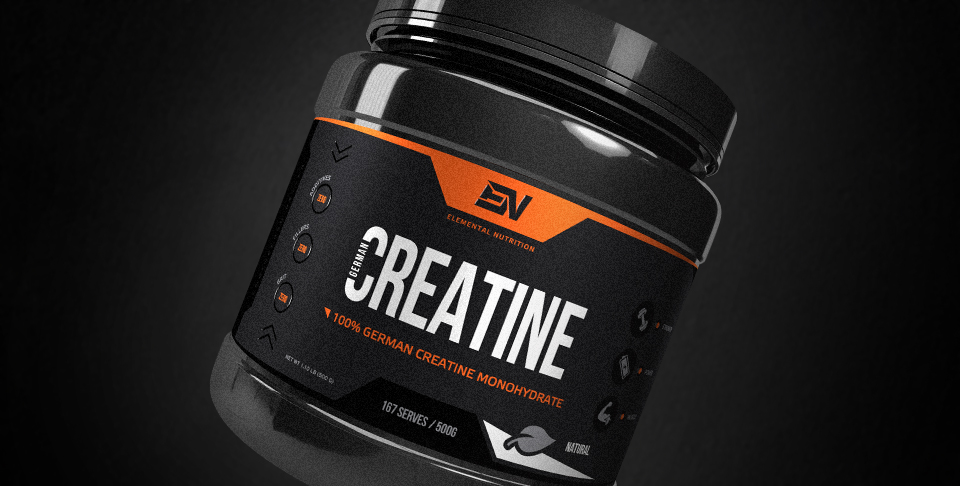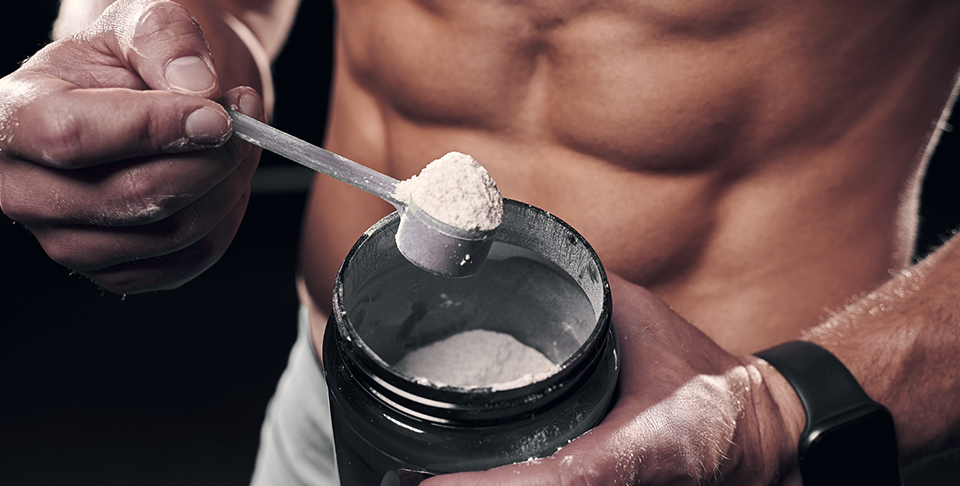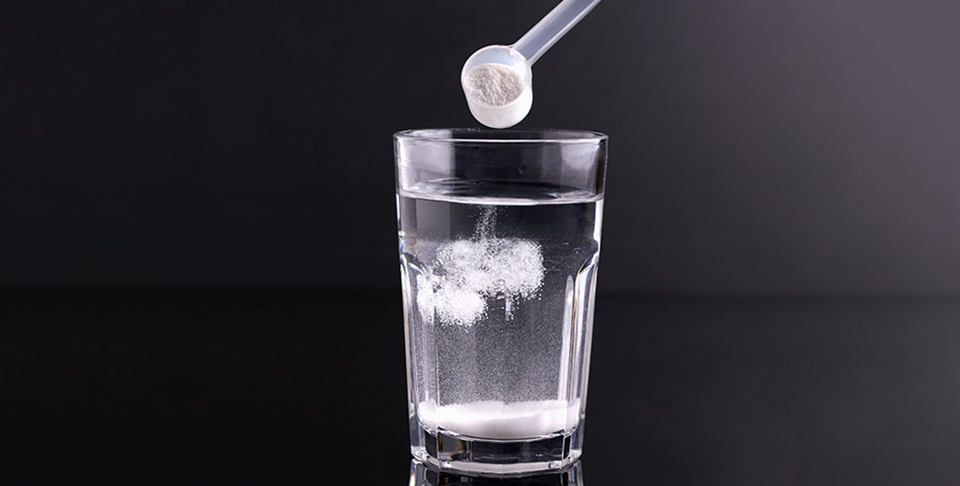Quick Summary
- Creatine is a naturally occurring amino acid produced in the human body & found in protein-rich foods like meat & fish.
- It's used as a dietary supplement for increasing muscle mass, energy production, & improving exercise performance.
- Creatine was first identified in 1832 by French chemist Michel Eugène Chevreul as part of skeletal muscle.
- Its popularity as a dietary supplement surged in the 1990s, backed by endorsements from athletes like Linford Christie & Sally Gunnell.
- About 95% of the body's creatine is stored in skeletal muscles, aiding in ATP production, essential for high-intensity, short-duration exercise.
- Some Types of Creatine Supplements include Creatine Monohydrate, Creatine Phosphate, Creatine Citrate, Creatine Pyruvate, Creatine Malate, Creatine Ethyl Ester & Creatine Hydrochloride (HCL).
- Forms Available: Creatine supplements come mostly in powders.
- Benefits of Creatine: Increases muscle strength & size. Enhances high-intensity exercise performance. Accelerates muscle recovery. May improve cognitive function. Shows promise in treating neurological & muscular diseases.
- Enhanced Absorption: Consuming proteins & carbohydrates with creatine may improve its absorption.
- Supplementation Procedure: Commonly begins with a higher-dose loading phase, followed by a maintenance phase.
- Cycling Practice: Some users cycle creatine intake, though its benefits remain unclear.
- Potential Side Effects: While generally safe, some users report stomach discomfort, muscle cramps, or dehydration. Proper hydration & following dosage guidelines are important.
- Kidney Concerns: Despite initial worries, research indicates that creatine doesn't harm kidney function in healthy individuals.
- Conclusion: Creatine is a prominent & well-researched supplement known for its athletic & muscle-building benefits.
Introduction
Creatine is a naturally occurring amino acid that is produced in the human body and is also found in protein-rich foods such as meat & fish. Over the past several decades, it has emerged as a popular dietary supplement due to its potential to boost muscle mass, enhance energy production, & improve exercise performance.
This in-depth article offers a comprehensive exploration of creatine, including its historical background, its various types, its potential health & fitness benefits, & its possible side effects.
Creatine: Historical Background
The story of creatine begins in 1832 when French chemist Michel Eugène Chevreul first identified it as a constituent of skeletal muscle. While it was recognized for its physiological role, it wasn't until the 1990s that creatine gained notoriety as a dietary supplement. This was largely due to endorsements by high-profile athletes, including British sprinters Linford Christie & Sally Gunnell, who attributed their enhanced athletic performance to creatine supplementation.
In the years that followed, creatine evolved from a niche supplement into one of the most widely researched & utilized sports supplements globally.
Understanding Creatine
Creatine is an organic compound that plays a vital role in energy metabolism. The human body naturally produces creatine, primarily in the liver, kidneys, & pancreas. Most of it—about 95%—is stored in skeletal muscle, where it aids in the production of adenosine triphosphate (ATP), the body's primary energy source for high-intensity & short-duration exercise.
While the human body can synthesize creatine, it can also be consumed through a diet rich in certain foods, like red meat & fish, or through dietary supplementation.
Types & Forms of Creatine
Creatine supplements are available in several types & forms, each offering unique properties:
- Creatine Monohydrate: The most common and well-researched type. It's affordable, effective, and easily absorbed by the body.
- Creatine Phosphate: Creatine bonded with a phosphate molecule. It's thought to help restore ATP levels more quickly, but it's less researched than creatine monohydrate.
- Creatine Citrate: Creatine combined with citric acid. It dissolves more easily in water than creatine monohydrate but requires a larger dose for the same effect.
- Creatine Pyruvate: A form of creatine bonded to pyruvic acid, thought to produce higher plasma levels of creatine, but more research is needed.
- Creatine Malate: Creatine combined with malic acid, which plays a key role in energy production. This type may lead to greater endurance and reduced muscle fatigue.
- Creatine Ethyl Ester: Created by attaching an ester to creatine to enhance its absorption. However, studies have suggested it might not be as effective as creatine monohydrate.
- Creatine Hydrochloride (HCL): Creatine bonded with hydrochloric acid. It's far more soluble & may cause fewer digestive issues. Further studies are required to confirm its efficacy.
These creatine types are available in various forms, including powders which are the most common, capsules & tablets, making it easy for individuals to choose a format that suits their needs & preferences.
Health & Fitness Benefits
Research has identified several potential benefits of creatine supplementation:
- Enhanced Muscle Strength & Size: Creatine supplementation can increase muscle creatine & phosphocreatine stores, potentially leading to gains in muscle strength & size.
- Improved High-Intensity Exercise Performance: By replenishing ATP stores in muscles, creatine allows athletes to maintain high-intensity exercise performance for longer durations.
- Accelerated Muscle Recovery: Creatine may hasten recovery post-workout by reducing muscle damage & inflammation.
- Improved Brain Health: Preliminary research suggests that creatine might enhance cognitive function, especially in tasks requiring short-term memory & quick decision-making.
- Potential Therapeutic Applications: Some studies indicate that creatine could potentially help manage certain neurological & muscular diseases, such as Parkinson's disease, muscular dystrophy, & others. Further research is needed.
Creatine & Diet
Creatine can be obtained through the diet by consuming protein-rich foods like red & white meats & certain types of fish, such as herring and salmon. For vegetarians & vegans, who typically have lower levels of creatine due to the absence of these sources in their diet, supplementation may be particularly beneficial.
Research indicates that the consumption of carbohydrates & proteins alongside creatine can enhance its absorption, underscoring the importance of a well-rounded diet when supplementing with creatine.
Creatine Supplementation
Supplementing with creatine typically involves an initial loading phase, where a high dose is consumed for several days to saturate the muscles with creatine. This is usually followed by a maintenance phase, where a lower dose is taken to keep the muscles saturated. The optimal timing of creatine supplementation is a topic of ongoing research, but some evidence suggests that post-workout supplementation may be slightly more beneficial than pre-workout.
The practice of "cycling" creatine—alternating periods of high and low intake—is common, but there is no clear consensus on whether it's necessary or beneficial.
Potential Side Effects & Safety
Creatine is generally considered safe for healthy individuals when used appropriately. However, some people may experience minor side effects like stomach discomfort, muscle cramps, or dehydration. To minimize the potential side effects of creatine, it's crucial to follow recommended dosage guidelines. Typically, a safe dosage is 3-5 grams daily after an initial loading phase. Staying well-hydrated is essential as creatine can lead to water retention, potentially causing dehydration. Adequate water intake can help manage any potential negative side effects.
Though there have been concerns about the potential impact of long-term creatine use on kidney function, numerous studies have shown that creatine supplementation does not appear to harm kidney function in healthy individuals.
Conclusion
In the world of dietary supplements, creatine holds a distinguished position, recognized for its capacity to improve athletic performance & its potential therapeutic benefits. It's also one of the most thoroughly studied supplements, & as research continues, our understanding of creatine, its benefits, & its uses is likely to continue evolving. Whether you're an athlete looking to enhance performance or someone interested in the potential health benefits of creatine, this versatile supplement offers a promising avenue for exploration.
References
- Brosnan, M. E., & Brosnan, J. T. (2007). Creatine: endogenous metabolite, dietary, and therapeutic supplement. Annual Review of Nutrition, 27, 241-261.
- Kreider, R. B., Kalman, D. S., Antonio, J., Ziegenfuss, T. N., Wildman, R., Collins, R., ... & Lopez, H. L. (2017). International Society of Sports Nutrition position stand: safety and efficacy of creatine supplementation in exercise, sport, and medicine. Journal of the International Society of Sports Nutrition, 14(1), 18.
- Cooper, R., Naclerio, F., Allgrove, J., & Jimenez, A. (2012). Creatine supplementation with specific view to exercise/sports performance: an update. Journal of the International Society of Sports Nutrition, 9(1), 33.
- Avgerinos, K. I., Spyrou, N., Bougioukas, K. I., & Kapogiannis, D. (2018). Effects of creatine supplementation on cognitive function of healthy individuals: A systematic review of randomized controlled trials. Experimental Gerontology, 108, 166-173.
- Candow, D. G., Vogt, E., Johannsmeyer, S., Forbes, S. C., & Farthing, J. P. (2015). Strategic creatine supplementation and resistance training in healthy older adults. Applied Physiology, Nutrition, and Metabolism, 40(7), 689-694.
- Persky, A. M., & Rawson, E. S. (2007). Safety of creatine supplementation. Sub-cellular biochemistry, 46, 275-289.
- Jagim, A. R., Oliver, J. M., Sanchez, A., Galvan, E., Fluckey, J., Riechman, S., ... & Kreider, R. B. (2012). A buffered form of creatine does not promote greater changes in muscle creatine content, body composition, or training adaptations than creatine monohydrate. Journal of the International Society of Sports Nutrition, 9(1), 43.
- Poortmans, J. R., & Francaux, M. (1999). Long-term oral creatine supplementation does not impair renal function in healthy athletes. Medicine and science in sports and exercise, 31(8), 1108-1110.






